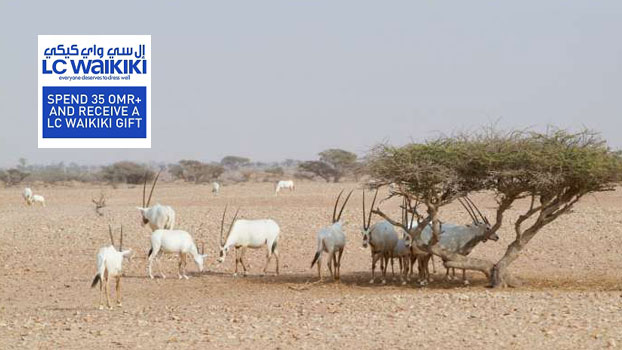
Muscat: The Sultanate of Oman accords great importance to preserving its environment, endangered animals and the associated ecosystems which are of historic importance.
Apart from the interest is evident in the work and achievement made in the environment sector during the past five decades. From the establishment of natural reserves, the adoption of laws, regulations and controls that regulate their management and criminalise their violators in all its forms, it has also worked to prepare action plans for their preservation, and development.
Sultan bin Muhammed Al Balushi, Director of the Arabian Oryx Department at the Environment Agency, told Oman News Agency (ONA): "The Arabian Oryx is considered a major environmental identity of the Omani natural history, and one of its valuable environmental legacies. The most important achievement in this regard is the launch of the project to conserve the Arabian Oryx in Oman. Its spread and natural habitats have received care in all its stages, namely: propagation, healthcare, re-release into the wild, and monitoring its movement."
He added that the issuance of Royal Decree No. (18/2023) amending the name of the Reserve of Living and Wildlife in Al Wusta Governorate to the “Arabian Oryx Reserve” as the first natural reserve in the Sultanate of Oman, amply shows the care it has received. It is home to many species of wildlife, most notably the Arabian Oryx which has deep connection to the region and local community.
The Director of the Arabian Oryx Department at the Environment Agency stressed the necessity of preserving the Omani wild environment symbols, stressing the need to include their names in the sites and accompanying projects to preserve them for the present and the future generation.
He stated that economic and industrial expansion does not contradict with preserving environmental ecosystem, as the natural environment (natural reserves) has become one of the main enablers of economic development.
He indicated that protecting, preserving, preserving and transferring the cultural and natural heritage of outstanding universal value to future generations can make a significant contribution to protecting the environment, its natural diversity and its interactions between people and the environment.
The Director of the Arabian Oryx Department at the Environment Agency concluded his statement by saying: Preserving the world heritage helps address some of the major environmental issues today, especially the increasing number of endangered and extinct plant and animal species, and the resulting decline in environmental diversity."
He stressed that the process of preserving and preserving the global environmental heritage is now taking place within the international context of environmentally sustainable development.